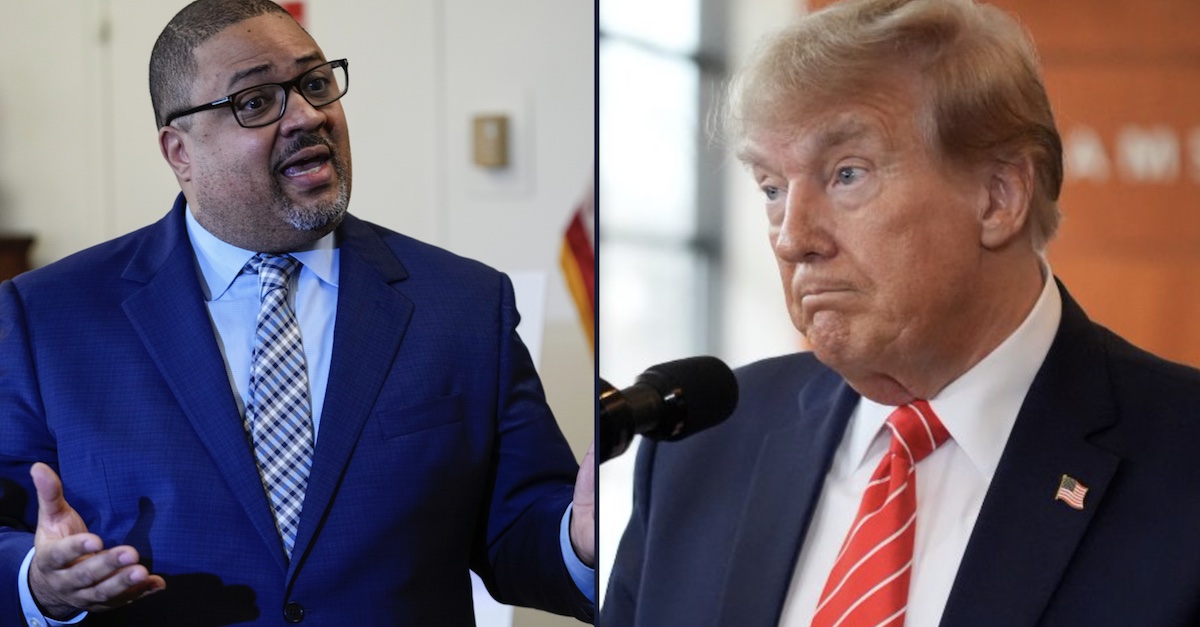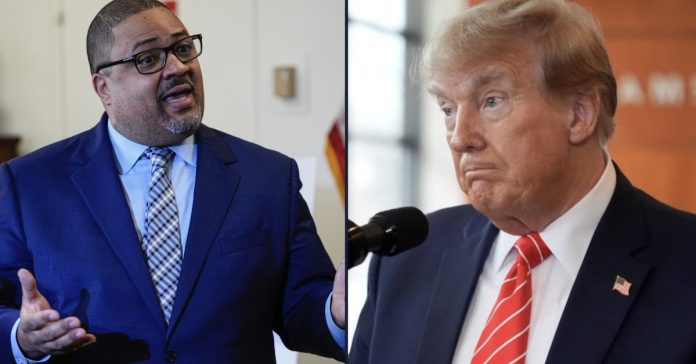
Left: Alvin Bragg (AP Photo/Frank Franklin II). Right: Donald Trump (AP Photo/Andrew Harnik).
A Manhattan judge on Monday was wholly skeptical of arguments by defense attorneys for former President Donald Trump regarding the late release of discovery materials in the New York hush money criminal case.
And that skepticism translated into an undiluted loss for Trump.
New York Supreme Court Justice Juan M. Merchan held a hearing to dispense with dueling allegations over the slew of documents dumped on the state and the defense by federal prosecutors in early March.
The state claims the more than 100,000 pages are the result of the defense’s own dilatory tactics. The defense, for its part, sought to implicate the district attorney’s office and the U.S. Attorney’s Office for the Southern District of New York into something like a united front — one intent on holding back relevant and voluminous documents that could inure to the 45th president’s benefit.
Defense attorneys have pushed for sanctions and a lengthy delay. The district attorney’s office wants a short delay, arguing that most of the documents are repetitive and actually harmful to the defense.
During a lengthy and oftentimes tense back-and-forth with Trump attorney Todd Blanche, Merchan disputed the basic claim at the heart of the defense’s argument: that the late arrival of the documents could somehow be blamed on the district attorney’s office.
Under relevant New York State discovery law, the documents in question — some 170,000-plus pages from a prior federal file in a case targeting longtime Trump attorney and fixer, Michael Cohen — would need to have been in the “possession, custody or control” of the state in order to trigger discovery obligations. Trump’s team claims, based on some prior work together, that county prosecutors should have obtained those documents from federal prosecutors months ago.
The judge, however, suggested the defense simply misstated the law.
“So you agree with me that the USAO doesn’t fall into that category?” Merchan asked Blanche at one point, according to a courtroom report by Just Security journalism fellow Adam Klasfeld.
In their briefs, defense attorneys for the embattled ex-president accused Manhattan District Attorney Alvin Bragg and his lieutenants of “serious discovery violations” and “widespread misconduct.”
Merchan signaled something like flabbergast at those allegations.
During another exchange, the trial court judge asked the defense to a cite a “single case” to show the district attorney’s office was under an obligation to obtain the documents from the federal office, according to a courtroom report by Law360 reporter Frank G. Runyeon.
But Blanche could not offer the case law.
“That you don’t have a case right now is really disconcerting because the allegation that the defense makes in all of your papers is incredibly serious. Unbelievably serious,” Merchan said, according to The Associated Press. “You’re accusing the Manhattan District Attorney’s Office and the people involved in this case of prosecutorial misconduct and of trying to make me complicit in it. And you don’t have a single cite to support that position.”
The court went on to increasingly ding the defense for its claims and the apparent lack of legal precedent to support them.
Then there were the facts in the form of timing.
Merchan also asked why the defense did not raise the discovery issues during a February hearing. Blanche replied that he was not aware of them at that point in time. The judge countered by referencing Blanche’s long tenure as a federal prosecutor — suggesting he, personally, should have known better.
The first production request for federally-sourced documents was filed in January; last week, another such request was filed.
“Why did you wait two months before trial? Why didn’t you do it in June or July?” Merchan pointedly asked Blanche at one point, who replied that it was not the defense’s job to try and obtain those documents from federal prosecutors.
The judge again countered: “It’s not the People’s job, either.”
By then, the implication was clear: the district attorney’s office could not be faulted for the behavior of federal agents — and the defense knew enough to force those handovers several months ago.
After a recess, the court’s understanding of the issues was laid out in an even more explicit and disdainful fashion.
“The People went so far above and beyond what they were required to do that it’s odd that we’re even here.” Merchan said.
In a bench ruling, the judge found that Bragg’s office was “not at fault” for the still-incoming avalanche of documents besieging the defense and “have complied and continues to comply” with discovery rules.
Jury selection in the case will now begin on April 15, the court ruled.
Have a tip we should know? [email protected]

